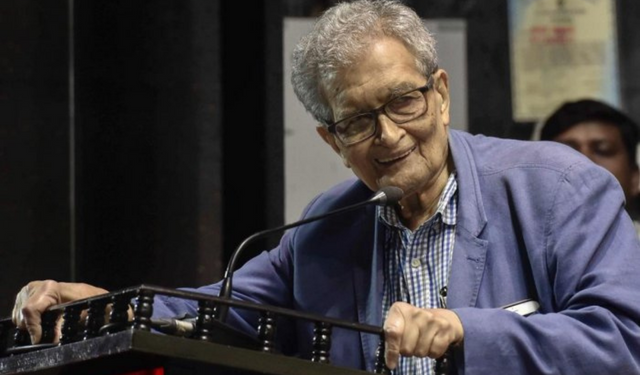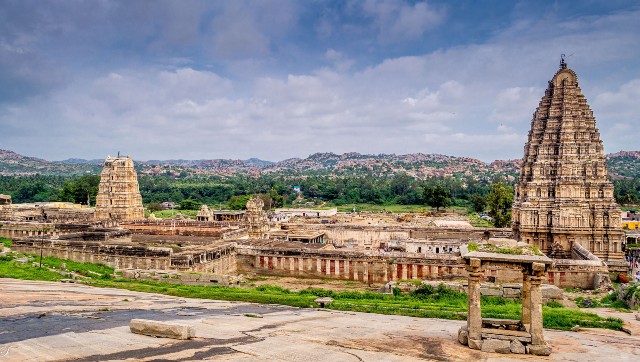Two of the world’s prominent economists from India, Nobel Prize-winning Amartya Sen and Jagdish Bhagwati of Columbia University have come out and expressed their opinion on the idea of Modi-led government. While Sen has once again reiterated the fact that a Modi government would be terrible for minorities, Bhagwati says that Modi stands for clean government.
In an interview to Times of India , Sen said that the issue of secularism cannot be ignored in this election and that while Modi might have been cleared by one judge, many charges still remain. “If minorities are scared of him assuming office, there are reasons behind it, though many well-placed Muslims don’t think so. In fact, some of them have joined him,” he told the paper.
He also dismissed the argument that he is pro-Congress and said that he has criticised the party in his book An Uncertain Glory which he wrote with Jean Dreze. Sen also refused to comment on the idea that the Rahul vs Modi debate had morphed into a Sen vs Bhagwati debate and said that “I don’t like writing about others.”
In contrast to Sen, Jagdish Bhagwati endorsed Narendra Modi’s Gujarat model and told TOI in an e-mail interview that, “Modi has the vision to take India to the next level.”
He also praised the Gujarat CM saying, “Narendra Modi’s own life, where he dedicated himself to social service, is par excellence the essence of Gujarat’s approach to wealth- create it but avoid self-indulgence.”
Where the Gujarat Model is concerned, Bhagwati told TOI, that it was not just about “creating prosperity.”
“It (Gujarat model) is also about using the wealth that is created, to increase social spending. Personal social responsibility works in Gujarat. Corporate Social Responsibility is meaningless if the corporation is making losses,” he told TOI.
As far as Modi’s economic vision is concerned, Bhagwati says it is clear where the leader is headed. “We already have a vision of where he will take us. Several things he can do with deliberate speed as he is identified with them. Thus, he is for clean government. And he is himself above reproach, the way Prime Minister Singh was always. I used to call him Yudhisthira among Kauravas! But we need systemic change,” he told the paper.
Sen and Bhagwati aren’t the only academics of Indian origin to be voicing their views on Modi and the 2014 elections.
Earlier this week, renowned sociologist Andre Beteille was quoted by IANS as saying that even though he was not a BJP supporter, it would be good if they came to power as a “long stint in the government for a single party is not good for democracy.”
“I am not a BJP supporter, but feel that they should come to power this time,” Beteille told media and said that “even the Communists and the Congress party have played the communal card at different time in history.”
Well-known economist Jean Dreze had also written an op-ed in The Hindu where he dissected the Gujarat model of growth, and pointed out that Gujarat had been doing well since 1980s and that few of the achievements had anything to do with Modi and that it was wrong to say to “attribute these achievements to private enterprise and economic growth.”
He writes, “Narendra Modi’s personality, for one, has been repackaged for mass approval. From an authoritarian character, steeped in the reactionary creed of the Rashtriya Swayamsevak Sangh (RSS) and probably complicit in the Gujarat massacre of 2002, he has become an almost avuncular figure — a good shepherd who is expected to lead the country out of the morass of corruption, inflation and unemployment. How he is supposed to accomplish this is left to our imagination — substance is not part of the promos. The Bharatiya Janata Party (BJP), too, is being reinvented as the party of clean governance, overlooking the fact that there is little to distinguish it from the Congress as far as corruption is concerned.”
He adds that many voters might think that “Gujarat resembles Japan, and that letting Mr Modi take charge is a chance for the whole of India to follow suit.”
More recently academics led by Professor Chetan Bhatt and Gautam Appa of the London School of Economics issued an open letter in the UK’s titled “The idea of Modi in power fills us with dread”.
They wrote , “As the people of India vote to elect their next government, we are deeply concerned at the implications of a Narendra Modi-led BJP government for democracy, pluralism and human rights in India. Narendra Modi is embedded in the Hindu Nationalist movement, namely the RSS and other Sangh Parivar groups, with their history of inciting violence against minorities. Some of these groups stand accused in recent terrorist attacks against civilians.”
In 2014 elections, the intellectual battles have been almost as bitter as the political ones.


)




)
)
)
)
)
)
)
)